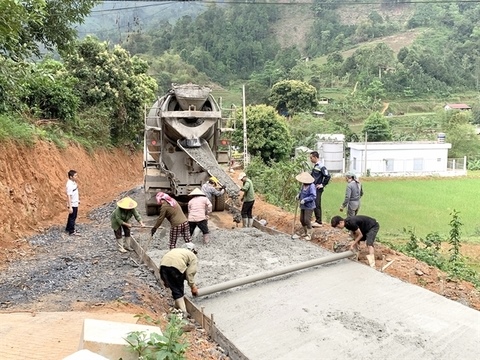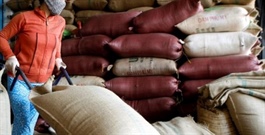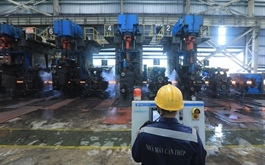Ministry proposes supports for building materials as cement has had the most difficult year in a decade
Ministry proposes supports for building materials as cement has had the most difficult year in a decade
The Ministry of Construction has proposed reductions of taxes and interest rates together with measures to promote the use of building materials in the context that the industry, especially cement, has had the most difficult year in a decade.

A concrete road being constructed in Bát Xát District, Lào Cai Province. Measures to promote the use of cement should be raised to help the industry overcome the difficult time. — VNA/VNS Photo Hương Thu |
Normally, the peak season for construction takes place from September to December when the construction material market is the most vibrant. However, it is different this year as demand for building materials such as iron, steel, brick and cement is low.
Looking at the cement industry, Lương Đức Long, General Secretary of the Việt Nam Cement Association, said that now is the most difficult time for the industry since its foundation more than a decade ago.
The pressure is coming from slumping sales in the domestic market coupled with rising product costs due to increasing prices of energy, coal and electricity.
With the modest annual growth in cement sales of 1.6 per cent per year, the industry faces an over productivity, Long said.
Another difficulty is that the export tax on clinker was raised from 5 per cent to 10 per cent this year.
Sharing the same viewpoint, Nguyễn Quang Hiệp, Deputy Director of the Building Materials Department under the Ministry of Construction, said that cement production dropped by 12 per cent in January – November and sales fell by 16 per cent compared to the same period last year.
Hiệp attributed the fall in cement demand to the frozen real estate market which pushed many enterprises into difficulty. In addition, the construction of public-invested projects is also stagnant.
A recent report by the Ministry of Construction pointed out that the domestic real estate market has plummeted, and the slow implementation of public-invested projects and global economic instability has affected the sale of building materials at home and abroad.
Some cement factories are forced to temporarily halt production as inventories remain high.
Proposed support
In order to support the building material industry to overcome the difficult time, the construction ministry proposed the use of cement in infrastructure projects to be increased.
Specifically, the Ministry of Transport should ask investors to use reinforced concrete viaducts for highway projects which are being designed, especially in areas of weak soil and lacking road base materials such as the Mekong River Delta.
Localities should increase the use of cement in road construction.
In addition, the policy of reducing value added tax by 2 percentage points should be extended.
The ministry also proposed policies be raised to encourage deep processing and promote exports.
The construction ministry urged the Ministry of Industry and Trade to launch anti-dumping investigations on several products which see significant increases in imports.
Producers should actively improve their competitiveness, diversify products and renovate production technologies and expand export markets, the ministry said.
According to Hiệp, greater attention must be paid to developing the urban infrastructure system, transport infrastructure and drainage systems, as well as removing difficulties for the housing market.
The export tax on clinker should be kept at 5 per cent instead of 10 per cent for at least the next two years, he said.




























